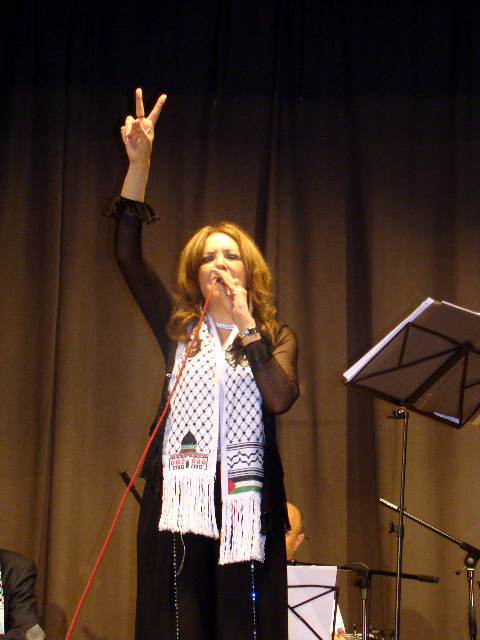Azza Balba is an Egyptian singer well known in the early ‘80s, but who was driven into obscurity because of her insistence on singing politically charged songs, especially those created by the team of composer singer Sheikh Imam and poet Ahmed Fouad Negm. The Tahrir Square uprisings of January 2011 brought Azza back into view, for she sang to appreciative crowds in the Square. Afropop’s Banning Eyre interviewed her in her Giza apartment in Cairo in August, 2011, shortly after she had returned from London, where she sang in a concert called “A Night in Tahrir Square” held at the Barbican Center. For the most part, we spoke in French, which Azza knows well having performed a lot in France, when she could not in Egypt.
B.E.: Azza, thanks so much for talking with us. Can you start by just introducing yourself?
A.B.: I am an artist, a militant, and I have a degree from the University of Commerce. After that, I studied music in an institute of Arabic music here. I have a diploma in Arab music.
B.E.: So first a commerce diploma, and then an Arabic music diploma. It sounds like you could have had an easier career than being a musician. Why did you decide to be a musician?
A.B.: I liked singing from when I was young. Our father wanted us to finish university. He wanted all of us girls to finish university, to have something in our hand, to work. But then I decided to sing. My father thought that we had to finish university first, and then we could do whatever we want. Our hobbies could come after we have a degree. That's the way he thought. Music was not important to my parents, like all the fathers and mothers in Egypt.
B.E.: Yes, I have been hearing the story. It's true in many places. And yet, you did go to school. You are trained to become a classical musician.
A.B.: The reason was I wanted to know about music more, to study classical music and have training for my voice, to sing classical songs. Like Umm Kulthum and Sayed Darwish.
B.E.: Who else?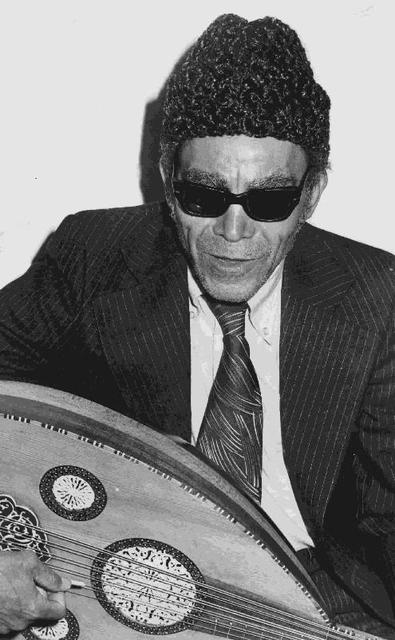
A.B.: After Sayed Darwish, Sheikh Imam, a revolutionary singer. I studied music, because it was necessary to train my voice. When you learn classical music in Egypt, it's very complicated. But you can become a very good singer.
B.E.: I see. Many great models. Umm Kulthum...
A.B.: And before. There's the older music, influenced by the Turks. And then Sayed Darwish, Abdel Wahab, Umm Kulthum. They took what was beautiful in that music, and they developed it in an Egyptian way. In my opinion, they developed the Turkish music that existed, and they made it Egyptian. Sayed Darwish, Abdel Wahab, and the composers for Umm Kulthum, because she didn't write her own music. She was a great singer, but there were composers behind her. Great composers. So what they did was to transform Turkish music into Egyptian. That was their role.
Above all, comes Sayed Darwish. He was the first. Because he, too, sang the Turkish forms before. Like the muwashahat, the adwar. He did these, but he also developed them, and with revolutionary songs, with songs that were very close to the people, the poor people.
B.E.: You mentioned Sheikh Imam. When did he sing?
A.B.: He started singing in the 60s. He started, above all with a poet Ahmed Fouad Negm, the poet. He started to make songs, revolutionary songs, against the regime in 1967, after the defeat of Egypt.
B.E.: So he was singing against the regime of Abdel Nasser.
A.B.: Yes. And he was imprisoned. I myself, I was in school. I did not know what was going on during those times. But they started their songs, very well-known songs, in 1967, after the defeat of the Egyptian army against Israel.
B.E.: So he sang these songs, and he was imprisoned. But the music has not been forgotten. People remember it.
A.B.: Yes. This music is very funny in my opinion. Because despite the boycotts, and despite being put in prison every year, and despite being forbidden everywhere. Despite all of that, the music became very well known, certainly among Arab people, not just the Egyptians. It circulated on little cassettes that went here and there. So these songs by Sheikh Imam and Ahmed Fouad Negm were very important. Both for their artistic sensibility, and the messages that circulated. These were not even cassettes for sale. They were just passed from person to person.
B.E.: That was the Internet of its time.
A.B.: Yes. Cassettes. For example, if you are going to Lebanon, I would send with you a few cassettes. Of course, it was forbidden to take these cassettes out of Egypt. Me, for example, I was in Lebanon with a cassette that had been made at the beginning of the Iranian revolution. And soon, these cassettes were everywhere in Lebanon. For free. But here, they were forbidden. Outside, free.
B.E.: Can you give me an example of one of Sheikh Imam's songs? Maybe explain the lyrics to me, so I get a bit of a sense of what made them so powerful.
A.B.: For example, there was a song that was well known in this time, after 1967 and the defeat of the Egyptian army. It was called "The Haha Cow." And the Haha cow represented the country. It was the strangers who had come. We could even consider Mubarak as a stranger, someone who was not attached to the country. But also foreigners, like Europeans, everyone who wanted to take the good things from Egypt. And the cow, here, they took the milk from the cow. They took everything out of the cow. There was no milk left. So it was very sad. A sense of the song in general, let me sing a little of it for you, to give it a sense. [SINGS]

Sheikh Imam singing for the revolution by Georges Bahgory
That song was very important because in the revolution of January 25, when I was in Tahrir Square, everyone asked for this song. It's a very old song. And the circumstances are very different. But they considered this song to be like Egypt now. Mubarak was like that. Egypt was the cow now. That was the joke. It was up to date. So this is a song I respect and admire a lot. A lot of those songs still seem up to date now. They are against injustice. They are against indignity. There with the poor. This is something very Egyptian about them.
B.E.: Before we get to Tahrir, I want to talk about your earlier career, during the 80s. Tell me a little bit about the beginning, and the problems that you had then.
A.B.: Me, I was not a professional before 1985. Before that, I sang, but not professionally. I knew Sheikh Imam and Ahmed Fouad Negm in 1975 at University in Alexandria.
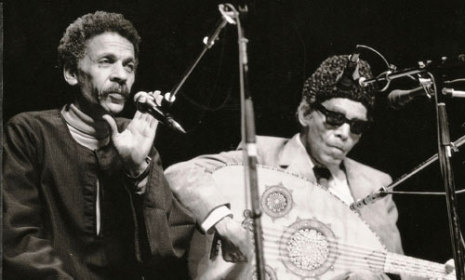
B.E.: The music or the men?
A.B.: The men. Sheikh Imam died in 1995, 15 years ago. I met them at 1975 at my University of Commerce in Alexandria. This is the first time I had really listened to them like that. As soon as I had heard those songs, I said I was going to sing this way also. I sang that way, always. Since my school days. I sang in French then. I sang a lot. But when I heard these songs, I said, "These songs, I want to sing these songs well, the songs of these two." Because the songs really touched me. I could feel that they were very frank, very real. I related to that. So I decided to stay with that, and I tuned my voice to be like Sheikh Imam's, very sharp. I really liked that. It was a little bit mezzo-soprano. That would have been a description of his voice. He liked me. And he helped me study some of his songs.
For sure, this was against the life of my parents. This was very dangerous. I came from a conservative family; they were not artists. There were many differences between our lives and their lives.
B.E.: Well that's a little bit the way it was in the 1970s everywhere, isn't it? There was a big divide between the generations.
A.B.: Yes Yes, for sure. There were a lot of changes. But for me, I was in a somewhat wealthy family, and I was able to follow my path. And this led to my marriage to the poet Ahmed Fouad Negm. He was 30 years older than me, and the circumstance with the police, and prison, this was very dangerous for us. He was older than my father, and older than my mother. To sing with them was to be menaced by the police, and prison. So we had to deal with this reality all the time. And I did this in secret. I didn't tell my parents about this marriage. So this was an adventure. It was an adventure for all the writers of that time.
B.E.: And this was the time you became a professional?
A.B.: No. This was before. My marriage was in 1976. I lived with him until 1982. We were divorced in ‘82.
B.E.: So you became professional during that time?
A.B.: No. I was not yet professional. I became professional after the divorce, 1984, 1985. I decided that this was my path. This is my domain. I did not want to change in order to sing on television or in the theater. I became like a star. I played Juliet in Romeo and Juliet in 1986. I did As You Like It. And I did lots of political theater pieces also. That was my passion. That was what I wanted to do in theater. I really love the theater. I never stopped singing the songs of my professor Sheikh Imam. I always considered him my professor, because he taught me so much. He was my first, my primary, Prof.
B.E.: I think I read that your first recording was in 1987. Is that right?
A.B.: From the years of 1985 to 1987, I was professional. And I did a lot of shows on television and in the theater. There was just one record.
B.E.: And was that songs of Sheikh Imam?
A.B.: No. That was forbidden. Forbidden.
B.E.: So what was on that first record?
A.B.: There were six songs. It was a cassette, not a record. Maybe six or eight songs. These were love songs, songs for humanity. But not politics.
B.E.: And on the stage, did you sing politics there?
A.B.: No. Not on television. Not on radio. No recordings. Because of the censors.
B.E.: What about concerts?
A.B.: Concerts were very limited. For example, maybe at a book festival. The book fair at that time was a liberal place, a place that would allow me to say what I wanted. Because the president of this festival at that time was liberal. Even if he didn't accept it. He's dead now, but he was a very liberal personality. He believed in hearing other opinions. He was not against that. The others were stupid. They were afraid of songs. It was tough. This was during the time of Anwar Sadat. 1978, 79. Me, for example, I was imprisoned a number of times during these years because I sang. Because I sang the words of Fouad Negm and of the songs of Sheikh Imam.
B.E.: Imprisoned.
A.B.: Yes. Three times I was in prison for songs. First singing at the university, around the time of elections. For nothing. Because they didn't have laws. After Mubarak, he made a law that gave the police extraordinary powers, an emergency law. That came during Mubarak. But at the end of the 1970s, I was imprisoned three times. They didn't have this law, so they let me out after a couple of months. Not much. After the law, you didn't come out at all. So I went to prison, and I went before the judge after a month. After a month, the judge asked, "Why is she there?" "Because she sang." "Okay, let her stay for two months." In prison. That was the democracy of Sadat. Because Sadat always said that he'd had democracy with laws. But with what laws? While I was in prison, the second time, I saw said that on television. I heard them say that there were no political prisoners. None. And there I was! He was a liar. Everyone could say he was a liar. Others would have visitors from the outside, from the Army, helping them. I was alone. My husband was not there. What Sadat said was not the truth.
B.E.: And when Mubarak came?

Abdel Gamal Nasser
A.B.: In the time of Mubarak, in the beginning, I was okay. I was a professional. Everyone wrote that there was a new voice, a new comedian in theater. They wrote well about me. And afterwards, one time, they started to say, "What is this? She is singing these songs?" I sang at the Book Fair when Khaled Mohedin was the president. He was one of the officials who had made the 1952 revolution with Abdel Nasser. And afterwards, he became a president of the left. He sometimes organized little conferences.
This guy was very respected, and he organized these little soirées, little conferences, among the peasants, the poor. In villages. And for me, to sing in villages, with the real Egyptian people, far from Cairo and Alexandria. This was very good. I really liked this. That was it. That was what I did. I sang in these little things. And I sang against the powers that be on television and radio. But then they started to interfere in all these domains. I couldn't do theater. I couldn't do films. I could not sing on television. I became forbidden.
B.E.: When was this?
A.B.: That was from about 1995 right up to the revolution.
B.E.: So what had changed?
A.B.: Well, they noticed that I was singing songs by Sheikh Imam, songs that were forbidden. They were people who controlled everything, they organized everything that was public. The guy who ran the television station for 20 years, they wanted only things that supported the regime. Anything that was even a little bit against the regime, they did not accept it. Everything was controlled by this person, the servant of Mubarak. Truly, he was a servant of Mubarak. From about 1985 on, it was like that.
B.E.: So they liked your voice. It was just the words that you chose to sing. That made you became an object of sabotage.
A.B.: Yes. And it wasn't just that I was being loyal to my professor. No. These songs were more real, more attached to the people who I believed in, the Egyptians. I believed in the Egyptians. These songs expressed their exhaustion, their frustration, everything. I felt good singing these songs. I was doing something. I had a role. That's why I was attached to this genre of songs.
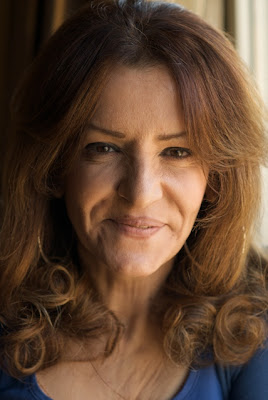 B.E.: And then you paid the price for that.
B.E.: And then you paid the price for that.
A.B.: Yes. For sure. For sure. There are always people who pay in art. Not so many, but they sacrifice. And they must do that. It's part of following that road.
B.E.: So when it became hard to sing here, you sang abroad, right?
A.B.: Yes. Here it was very limited. Outside, there were, for example, opportunities in Berlin. There was a Palestinian who arranged events for our people there. There was an Egyptian in Vienna who organized every year a week of culture and politics of Egypt. And all the Arabs in Vienna came every year to make this concert. In Paris, the Tunisians organized some things. I was there. Even the Iranians. The Iranian resistance. I was against the Islamist regime, all the Islamist regimes. So I was involved with the resistance in Paris, against that regime, the regime of the mullahs. So I sang songs to support them. I was with them.
B.E.: So you continued in this mode right up to the revolution. Tell me what happened for you earlier this year.
A.B.: About three years ago, I joined Facebook. There were just young people doing it at that time. My kids. I went there to see. These kids, what are they doing? I wanted to see how this generation was thinking. So I joined Facebook, and I noticed that there were a lot, a lot, a lot of people who are thinking about politics. And that surprised me. Because before that, I had the impression that people were asleep. Middle-class people, young middle-class people, were on the Internet. I thought they weren't interested in their country, in politics. I thought they were interested in pop singers, movies that say nothing, football stars who are famous in Egypt. But when I got on Facebook, I saw something else.
Despite all the ignorance that was on the television, the great ignorance that was on television and in theater, and in the culture in general—because there really is no culture there—but despite all that, there were people thinking about the country, about politics, about the regime. I had fear when I saw that. Everyone was afraid. Before.
B.E.: So you saw both courage and fear.
A.B.: Yes. Fear. There was fear. People were not giving their real names. They would give their opinions, but always behind a name that was not theirs. But after two years like that, I was always communicating with these young people on Facebook. 2010, and especially after the death of Khaled Said, who was killed in Alexandria by the police for doing nothing, there was a revolution among the young. And the fear was broken. Everyone started writing, writing, writing.
B.E.: They found their courage.
A.B.: For sure. Everyone put themselves in the position of Khaled. He was a middle-class kids like them. He was on the Internet. He hadn't done anything. They asked him for his papers and he asked why. He responded to the police. That was it. That was the beginning. In 2010. That was the beginning of the revolution on the Internet. And after Tunis, after the Tunisian revolution, I was sure, certain, that this was coming. I was waiting for it. I knew it was coming. I was not surprised.
And even the day of January 24, I had a concert at the union. I sometimes sang for the journalists’ union. And this was to celebrate the Tunisian revolution. And I remember I said into the microphone, "There are not too many people here today. What's going on? Maybe people are prepairing for a demonstration tomorrow. So I invite all of you to go into the street tomorrow for a demonstration of youth." And that was the beginning. The young people were jealous of the Tunisians. They were jealous.
B.E.: They thought, “Why not us?”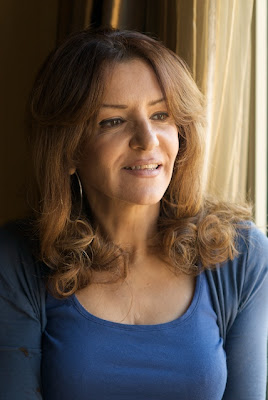
A.B.: Why not us? There are a lot more of us than there are Tunisians. And the Egyptians are even more pressed, more poverty, more sickness, more problems caused by the regime. So many things that didn't work, so many problems caused by the regime. So the people were sick, and poor, and ignorant. We deserve more. So I was reading this on the Internet from before the revolution of Tunisia all the way through our revolution.
I was surprised by the numbers, the numbers for sure. In all the towns of Egypt on the 28th. I was surprised by their courage. I was surprised by their attitude in Tahrir. They were so cultured, so civilized. That surprised me all that was a surprise. The numbers, the attitude, the art. People came and did theater. They sang, they made all sorts of music. They played cooking pots. Young people. Every day, you would discover art. I went down on the 28th. Because at first my husband wouldn't let me. I fought with all my heart, and then I decided on the 28th. Because my friends were there too.
B.E.: The 28th was tough.
A.B.: It was tough. We saw everything. People dying before our eyes, people bleeding, right before our eyes. Everyone was faced with death. So I went every day, just until I had no more voice. I would wait one day at the house, and I would return. Because I sang, I went to sing. The reason that I sang every day was because of the people. On the 28th, I found myself on BBC television, just by chance. I was on the news, all day. And when I went on the 29th, in Tahrir, people knew me. “I saw you on the television yesterday.” “Me?” And then I felt I must be there, as an artist. I had earned respect. My presence in Tahrir was very important.
B.E.: How did you sing there, with musicians?
A.B.: No. Because I had done a lot of concerts with no money, without musicians. I had a little bit of music on my laptop. And I would connect it to some sound system, whatever was there, and I sang.
B.E.: And what songs did you sing?
A.B.: Above all, "The Haha Cow." And a song that talks about the 1970s. “Good morning to the flowers in the garden of Egypt. Good morning to the beautiful flowers who have opened in the garden of Egypt.” It's a beautiful song by Sheikh Imam. And I sang a song of my own that I wrote in 2010 that's called "The Dream." It says the dream will come. It will be realized.
B.E.: And this was something that you wrote after you'd had this experience of Facebook and discovered that young people were engaged, and you felt that something really was going to happen.
A.B.: Yes. And there was another song that talked about the scars of my country, or the wounds of my country. This song was for Khaled Said, along with "The Dream." These two songs I created before the revolution. And I sang these songs in Tahrir. I sang many songs by my professor, and songs of my own. And people always asked for the same songs. They would tell me, "You must be there to sing. To encourage people to come and to stay." That was my role.
B.E.: I have asked a lot of people about the music that was performed in Tahrir square, and I understand that the crowds were very particular about what kind of music they heard. I've heard a lot of stories about this. People did not want to hear happy songs. Is this true?
A.B.: Yes. All their lives, this generation, especially the young, they've heard nothing but love songs. Or love songs that imitate the old songs, that are not beautiful anymore. They wanted songs about patriotism. Patriotic songs, that was for them the old stuff. The things that they no longer heard on the radio, certain songs from Shadia, from Abdel Halim, the things that we heard when we were kids. But they also knew the songs of Sayed Darwish, Sheikh Imam. They knew these songs from the Internet, or from my concerts. They wanted patriotic songs, nothing else. That was the soul of the movement.
B.E.: And I understand that people themselves sang a lot of songs.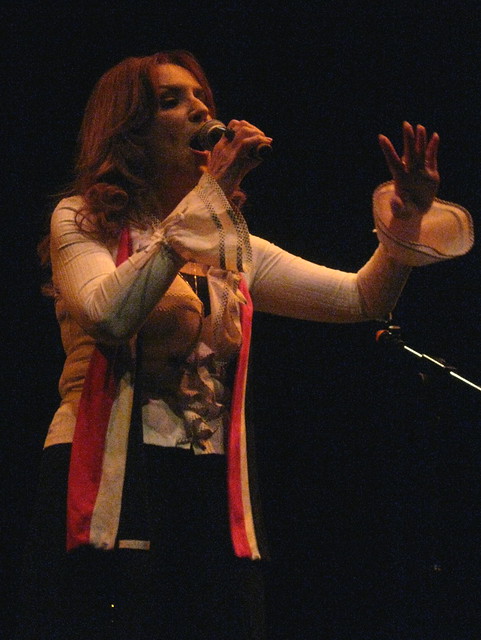
A.B.: Yes. A lot.
B.E.: So I'm going to ask you about some singers, and you tell me if they sang those songs. Abdel Halim Hafez.
A.B.: Yes.
B.E.: Sayed Darwish.
A.B.: Yes. "Bladi Bladi." [“My Country, My Country” Egypt’s national anthem.]
B.E.: Sheikh Imam.
A.B.: Sheikh Imam, yes.
B.E.: Mohamed Mounir.
A.B.: Mohamed Mounir, not very much. Mohamed Mounir was not there. Everyone was waiting for him to come. "Mohamed, please come. Please, please come." Everyone. All his friends. But he didn't come. He was not there. If he had been there, it would have been something else for him. A different story.
B.E.: Well, he told me that he had just undergone a very serious operation. It was not possible for him to move to the square. He sent his video of "Ezzay."
A.B.: Okay. Okay, I believe him. I believe in. He's my friend. I know him well. But he was not there. Even his songs. [Azza’s sister points out that the song “Ezzay” was not written for the revolution. It already existed.] He did have one song made with Yusuf Shaheen. A great patriotic song, "Hadouta Masrya." That was there. It was from a film by Yusuf Shaheen, sung by Mohamed Mounir. People love that song. That I heard. That is true.
B.E.: I also heard reports about a very new kind of music that was at Tahrir, this kind of DJ music from the poor neighborhoods. Basically wedding music. It's a mix of sha'bi and techno. Not a commercial music. But I heard that this music was accepted. Did you see that?
A.B.: Yes. For sure. I saw young people who spoke more than they song, like rap. They do that in Arabic. That was very interesting to me because they were always there, these young people.
B.E.: And had you heard this music before?
A.B.: No. No. The place was full, full, full of genres of music. Very young and very new, and very old. And folklore, like El Tanbura. Very folklore, and they speak of the popular resistance in Port Said going back to 1956. During the war in ‘56. That was there too, with the tanbura and the simsimiyya. That was beautiful. And there was the rap of these young people who talk more than they sing. They spoke a lot, and very fast. For me that was very interesting, and new.
B.E.: And backed up just by keyboard.
A.B.: Yes. Yes. And they were people like me who sang with recorded music. And there was someone with his guitar.
B.E.: Ramy Essam?
A.B.: Like Ramy, and also Mohammed Mossin with his oud, and he sang the old songs by Sayed Darwish and Sheikh Imam with a really beautiful voice. And there was Mustafa Said who is blind, and he sang. The place was full, full, full with musicians. There were not very many singers from my generation. I was alone. There was no Mounir. He is my generation, a little older. But the same generation. Mohamed Haloo, Ali Haggar, Methat Saleh, Nadia Mustafa, Hani Shaker, Mohamed Salwa—all of my generation was not there. They were not there. They were the young, our kids. And they were the old people from before like Ahmed Fouad Negm, who is 82 or 83. He came to Tahrir. He can't even walk well now. He struggles to walk. Someone said that he had an operation. But it was very important for him to be there. This is to show that the people who gave me all my glory, they had to come, they had to be there. Because it was they who have given me my glory. I could never be a big star, because I was for the poor. But the big stars who took all their glory from these people, they had to be there. They should have been there.
B.E.: And speaking of big stars, that's another group that was not there, the big stars of today like Amr Diab and Tamer Hosni.
A.B.: That's who I'm talking about. They were not there. Not even this singers only. It really after is, the comedians.
B.E.: And why not? Were they afraid?
A.B.: They were afraid for their interests.
B.E.: Okay. Because their success, their records and concerts and broadcasts, all that depends on the big power people who are linked to political people.
A.B.: Yes. To the regime. They're afraid to lose that. Or also, people believed that the regime was going to come back. So they wanted to stay with those who were supporting the regime.
B.E.: So do you think those people have really hurt themselves?
A.B.: No, they will recover their popularity, because people will forget. Egyptians love art. They believe a lot in art, in music, in film, and in cinema. The people of Egypt are an artistic people by nature. They are artists. They love that. By contrast, the regime did not believe at all in art, but the people believe in art. The people consider artist to be very special. So they will return with people. But those who were actually against the revolution, that's harder. People go on the Internet, they don't see Tamer, they don't see Rada Abderazek, who is in a big series on television during Ramadan.
B.E.: I understand that Tamer is portraying a revolutionary himself in his series on television now?
A.B.: LAUGHS. It's funny. And here's this guy who was crying for Mubarak on television. "Me I love Mubarak!" But is finished for him on the Internet. I'm very happy in my life to have seen this. And I'm happy that the revolution in Egypt happened.
B.E.: Of course it's not finished.
A.B.: Of course.

B.E.: I have a question about the cultural side of the revolution, especially music. I have heard a sentiment among a lot of alternative and independent artists that the industry and culture of music has been a bit broken. If it wasn't Umm Kulthum and Abdel Halim Hafez on the one hand, or Amr Diab and Tamer Hosni on the other, or else the Koran, there's really nothing else. On radio, on television. So there's all this creativity happening that never gets recognized. So do you think that after the revolution that will change?
A.B.: Well, for the reasons that you've given, there was nothing. There was nothing but those things you name, people that sing for the regime, even the old music was not enough. It was not enough for us to develop. Above all in the time of Mubarak, there was not a station that would always play Umm Kulthum and Abdel Halim. Not really very much. To really support the old music.
B.E.: Oh really? So this station that I've been hearing on the radio that displays old music, that's new?
A.B.: Yes, but before, during the time of Mubarak, in the last seven or eight years, it started. In the beginning of the station, I was very happy because I wanted to listen to the old music, I could do that. I didn't have to search on the Internet. So that has given a big moment. But then I found at that station started to change, and play new stuff.
But then after the revolution is finished, I'm sure that art will be very different. It's going to have to be more real, because it's gotten so far from the people—a great distance from the people. It's going to have to touch the people. It's going to have to be real and frank. It's going to have to be very different than the art of the period of Mubarak, because that was all organized by the regime. People accepted that because there was nothing else. Hotel music, hotel films. People were left in this great state of ignorance. But they are intelligent. They can tell the difference between real things and fake things. They will understand this difference. They won't be fooled again.
And with freedom, because always there are certain stations on the television, even in the comedy, but after the revolution, they will do things different from before. They've begun already adding things they could not have done before. There are more liberated. And that's going to give us a lot. This freedom. There will be many new creations. We're not really at the point of being in the result of the revolution yet.
B.E.: Yes this is a difficult moment, and a difficult moment to understand.
A.B.: Yes very difficult. And economic questions are not yet resolved. We will see. We must wait. But I really hope that when they resolve the economic problems, people will feel free.
B.E.: Of course, we must wait. But you really do believe that things will change.
A.B.: Yes. What I saw in Tahrir, so much music, so much theater. I am sure that this will create amazing things in music, and film, and theater. They were there. There were lots of young theater and cinema people there. And a lot of singers who are born in Tahrir, like Ramy. People will develop like that. And even better, much better than they were before.
B.E.: Thank you so much.

Azza with Banning Eyre







